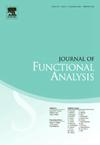On directional blow-up for a semilinear heat equation with space-dependent reaction
IF 1.7
2区 数学
Q1 MATHEMATICS
引用次数: 0
Abstract
We consider nonnegative solutions u of the Cauchy problem for a semilinear heat equation with space-dependent reaction: , , where satisfies some condition and the initial data satisfies with . We study weighted solutions which blow up at minimal blow-up time. Such a weighted solution blows up at space infinity in some direction (directional blow-up). We call this direction a blow-up direction of . We give a sufficient and necessary condition on for a weighted solution to blow up at minimal blow-up time. Moreover, we completely characterize blow-up directions of by the profile of the initial data.
关于具有空间反应的半线性热方程的定向膨胀问题
我们考虑一个半线性热方程的考奇问题的非负解 u,该方程的反应与空间有关:ut=Δu+μ(x)up,u(x,0)=u0(x),其中μ(x)≥0 满足某些条件,初始数据 u0(x)(≢0)满足‖μ˜u0‖L∞(RN)<∞,μ˜=μ1/(p-1)。我们研究的加权解 "μ˜u "会在最小爆破时间内爆破。这样的加权解会在空间无穷大的某个方向炸毁(定向炸毁)。我们称这个方向为 μ˜u 的炸毁方向。我们给出了加权解在最小炸毁时间内炸毁 u0 的充分必要条件。此外,我们通过初始数据的轮廓完全描述了 μ˜u 的炸毁方向。
本文章由计算机程序翻译,如有差异,请以英文原文为准。
求助全文
约1分钟内获得全文
求助全文
来源期刊
CiteScore
3.20
自引率
5.90%
发文量
271
审稿时长
7.5 months
期刊介绍:
The Journal of Functional Analysis presents original research papers in all scientific disciplines in which modern functional analysis plays a basic role. Articles by scientists in a variety of interdisciplinary areas are published.
Research Areas Include:
• Significant applications of functional analysis, including those to other areas of mathematics
• New developments in functional analysis
• Contributions to important problems in and challenges to functional analysis

 求助内容:
求助内容: 应助结果提醒方式:
应助结果提醒方式:


